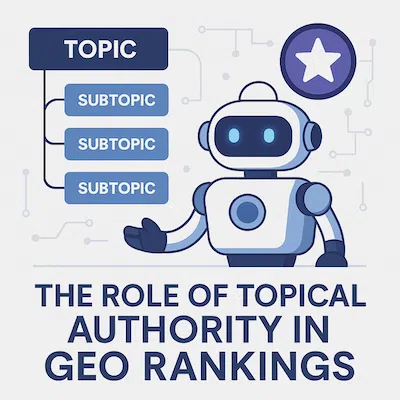Saturday, August 23, 2025 |
Brief Overview:
This article explores why topical authority, long a staple of traditional SEO is now essential for ranking in generative AI outputs. It explains how content depth, semantic relationships, and expertise around a focused theme dramatically increase your brand’s chances of being referenced or summarised by AI systems.
Why Topical Authority Is Crucial for GEO
Topical authority refers to how comprehensively and consistently your site covers a particular subject area. In the world of generative AI, this authority doesn’t just help with ranking, it helps shape how your content is summarised, paraphrased, or cited.
Unlike traditional SEO, which favours individual pages for specific keywords, GEO rewards domain-level expertise across inter-related topics.
How Generative Engines Assess Authority
AI models are trained to look for:
-
Thematic consistency across multiple pages
-
In-depth answers to related user queries
-
Patterns in vocabulary, tone, and structure that reinforce expertise
-
Semantic relationships between concepts using internal links and structured content
Websites that produce deep, consistent content on a niche topic are more likely to become default sources in AI summarisation, even if they’re not top of traditional SERPs.
Building Topical Authority for GEO
-
Create Content Clusters (Pillar + Cluster Model):
-
A central “pillar” page covers a broad topic (e.g., “Complete Guide to Video Marketing”).
-
Supporting articles cover subtopics (e.g., “Scriptwriting for B2B”, “Video Metrics to Track”).
-
Interlink them to create semantic strength.
-
-
Map User Intent Across the Funnel:
-
Cover awareness, consideration, and decision-stage questions within each cluster.
-
Example: Start with “What is GEO?”, then go deeper into “GEO for Local Businesses”, “GEO Content Formats”, and “Tracking GEO Performance.”
-
-
Answer Edge-Case Questions:
-
Go beyond the basics. AI models seek unique insights to provide added value in answers.
-
Address niche angles, advanced strategies, or industry-specific applications.
-
-
Update and Expand Continuously:
-
Freshness contributes to perceived authority.
-
Add new internal links as you publish related content.
-
Hidden Gem Insight:
Most brands overlook latent semantic indexing (LSI) terms, secondary keywords that AI uses to understand context. By including semantically related phrases across a cluster (e.g., “video storytelling”, “micro-content”, “visual scripting”), you help AI models associate your site with deeper topical expertise, not just individual keywords.
Tools That Help Build and Signal Authority
-
Internal linking maps: Tools like Screaming Frog or Sitebulb help you visualise your internal linking structure.
-
Content gap analysis: Identify missing cluster content using tools like Ahrefs, SEMrush, or Surfer SEO.
-
Schema markup: Use structured data to tag authorship, reviews, and expertise elements.
Final Thoughts
Topical authority is no longer a “nice-to-have”, it’s a core ranking factor in the world of generative AI. If your content ecosystem demonstrates depth, clarity, and internal semantic links, AI engines are far more likely to surface your brand when answering related questions.
In GEO, the winners won’t be those with the most content, they’ll be those with the most cohesive content.
